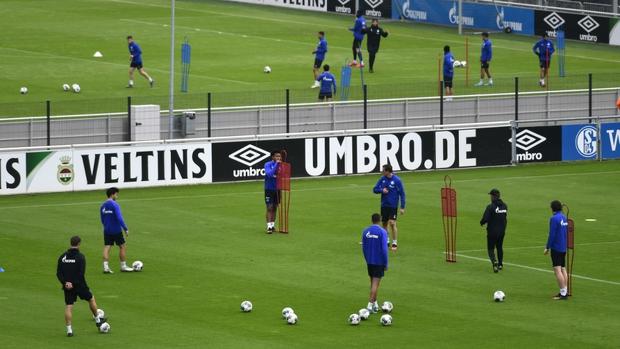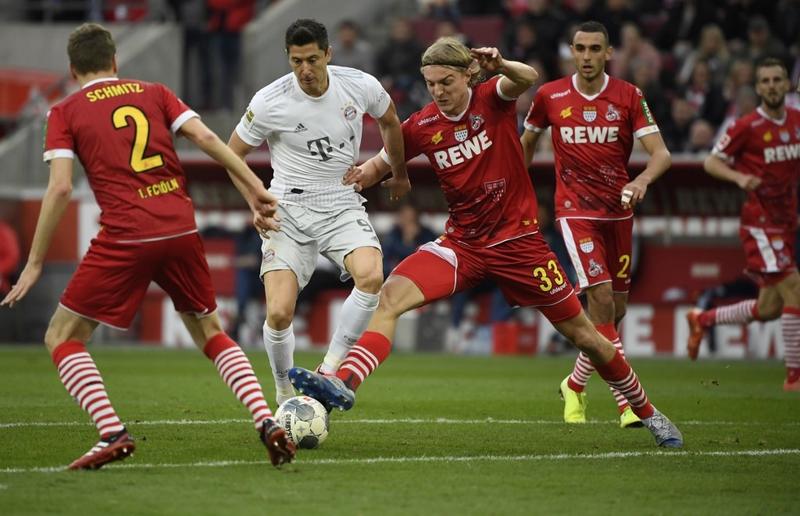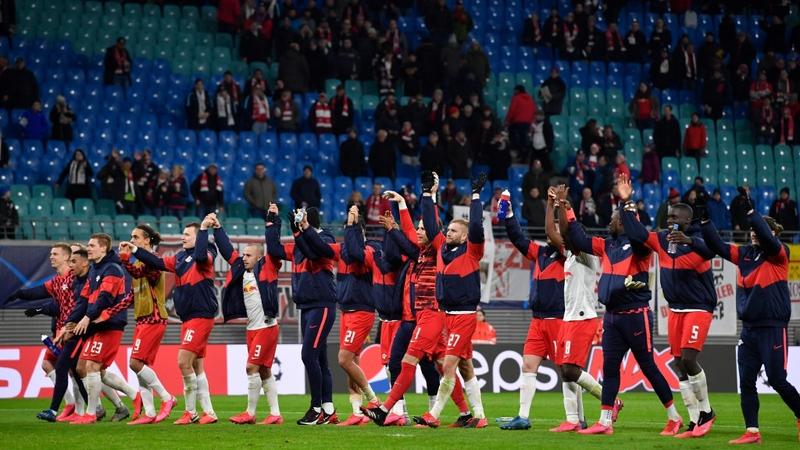 The team of German Bundesliga club FC Schalke 04 attends a training session at the club's training grounds in Gelsenkirchen, western Germany on April 29, 2020 amid the new coronavirus COVID-19 pandemic. (INA FASSBENDER / AFP)
The team of German Bundesliga club FC Schalke 04 attends a training session at the club's training grounds in Gelsenkirchen, western Germany on April 29, 2020 amid the new coronavirus COVID-19 pandemic. (INA FASSBENDER / AFP)
BERLIN - Germany's professional football clubs have extended their hygiene measures to ensure political approval to resume regular league action by May 16.
In collaboration with the league association, the clubs announced an extension of their regular testing program to the player' family members.
This Wednesday, German Chancellor Angela Merkel and the 16 federal state prime ministers are said to decide about a possible restart of league action.
ALSO READ: German leagues start restricted training in small groups
Several clubs, such as RB Leipzig, announced a team quarantine for a period of 7 to 10 days as the first step to finish the 2019/2020 season
The remaining nine rounds of matches will take place behind closed doors.
Players and family members will undergo two tests per week. The association demands from the players' families to increase their efforts of self-isolation.
Several clubs, such as RB Leipzig, announced a team quarantine for a period of 7 to 10 days as the first step to finish the 2019/2020 season.
Following the first test-cycle of all 18 Bundesliga clubs, 14 reported entirely negative results. Three sides, such as Borussia Moenchengladbach, Leipzig, and the FC Augsburg, didn't report test results. Only FC Cologne revealed three positive tests.
According to reports, two players and a staff member had been tested positive and were sent into home quarantine. This Monday, the second round of tests are scheduled.
Most clubs plan to return to full team-training this week. Until now, only training in small groups was allowed.
Team-training is said to be a crucial point in case of further positive tests. So far, it seemed part of the deal to put the entire team under a 14-day extended quarantine.
The Cologne club said to only isolate the positively tested persons has found the approval of local health authorities. The club said the strategy of regular testing is allowing individual solutions for every tested case.
 Bayern Munich's Polish forward Robert Lewandowski and Cologne's Belgian defender Sebastiaan Bornauw vie for the ball during the German first division Bundesliga football match 1 FC Cologne v FC Bayern Munich in Cologne, western Germany on Feb 16, 2020. (INA FASSBENDER / AFP)
Bayern Munich's Polish forward Robert Lewandowski and Cologne's Belgian defender Sebastiaan Bornauw vie for the ball during the German first division Bundesliga football match 1 FC Cologne v FC Bayern Munich in Cologne, western Germany on Feb 16, 2020. (INA FASSBENDER / AFP)
Other squad members and staff haven't been direct contacts of the positive tested the club claims. One player admitted having had contact with one of the cases.
It remains uncertain if the concept of individual solutions can be maintained when regular team-training starts again and games take place as the number of so-called direct contacts is going to increase.
Before the clubs can return to team training, health authorities must give their approval. Leipzig and other clubs claim to have received "positive signals" after talks.
Critics say to only isolate positive tested is not the right way and hasn't been part of the concept that caused mostly approval by politicians.
Professor Dr. Tim Meyer, head of the league's corona task force, admitted the susceptibility of the implemented system.
 Leipzig players celebrate after the UEFA Champions League football match between RB Leipzig and Tottenham Hotspur, in Leipzig, eastern Germany on March 10, 2020. (JOHN MACDOUGALL / AFP)
Leipzig players celebrate after the UEFA Champions League football match between RB Leipzig and Tottenham Hotspur, in Leipzig, eastern Germany on March 10, 2020. (JOHN MACDOUGALL / AFP)
"A large number of positive tests can endanger the system," the medic said, adding: "It requires a great amount of discipline of all involved."
READ MORE: Bundesliga takes up e-sports with live games on hold
Meyer said 2000 people had been tested in the first round. "We can't exclude getting further positive results; we didn't expect to get none."
To minimize the risk, only players are allowed to attend the team training that has been tested negative twice in advance. "It is an illusion to expect complete security, but that hasn't been a realistic goal," Meyer commented.
Germany's home secretary Horst Seehofer said the entire team has to be sent into quarantine in case of a positive test. Seehofer renewed his point to support a season restart based on the submitted concept.


